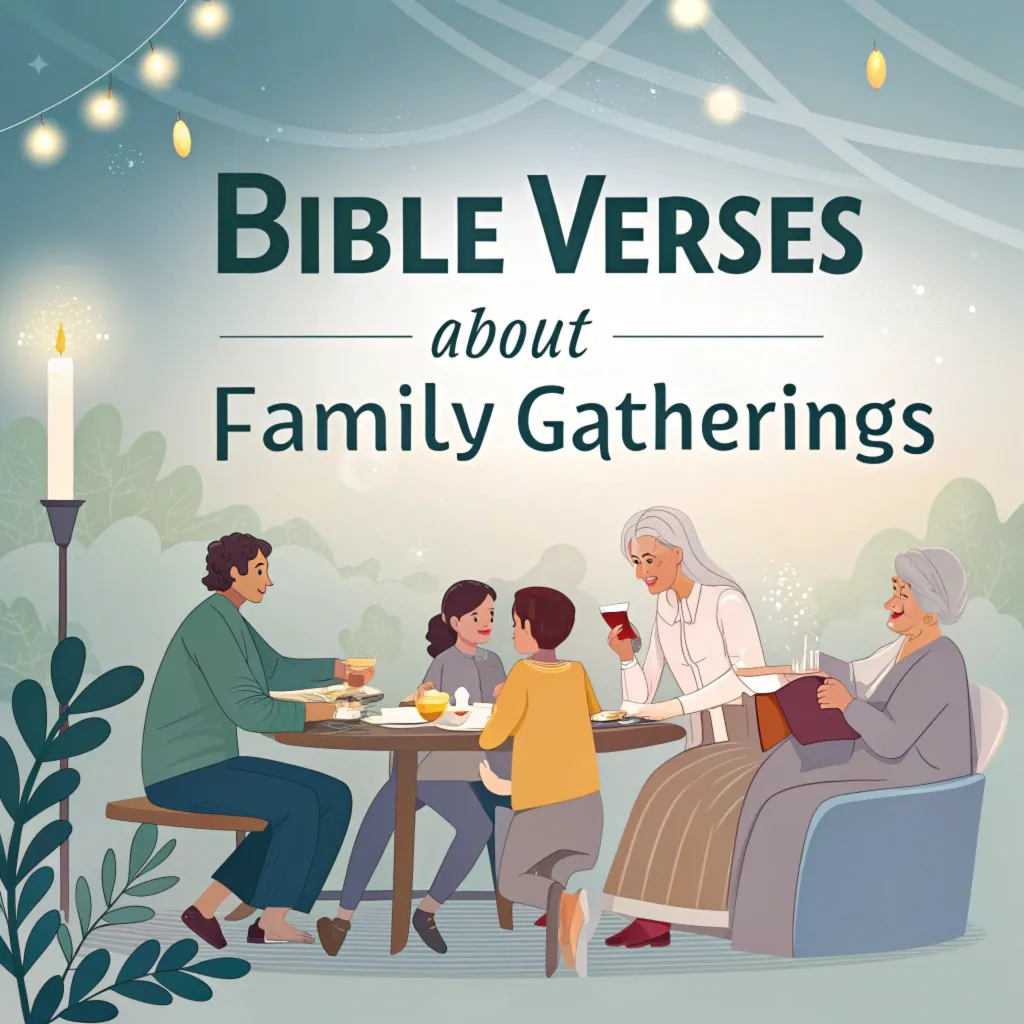12 Powerful Bible Verses About Family Gatherings: Strengthening Family Bonds
Family gatherings hold a special place in our hearts, bringing loved ones together to create lasting memories.
The Bible offers wisdom and guidance on the importance of family unity and togetherness.
Let’s explore 12 inspiring Bible verses that emphasize the value of family gatherings and encourage us to cherish these precious moments.

Key Takeaways: Bible Verses for Family Gatherings
- Psalm 133:1 highlights the beauty of family unity
- Colossians 3:13 teaches forgiveness within families
- Ephesians 4:2-3 emphasizes patience and love in relationships
- 1 Peter 3:8 encourages like-mindedness and compassion
- Galatians 6:2 promotes supporting one another
- 1 Thessalonians 5:11 stresses the importance of encouragement
- Romans 12:10 advocates for showing honor to family members
- Hebrews 10:24-25 emphasizes the value of meeting together
- Matthew 18:20 reminds us of God’s presence in gatherings
- Proverbs 17:17 highlights the enduring nature of family love
- Ecclesiastes 4:9-12 illustrates the strength found in unity
- 1 Corinthians 1:10 calls for agreement and harmony in families
Family gatherings are more than just social events; they are opportunities for growth and spiritual nourishment.
These moments allow us to strengthen our bonds, share our faith, and create lasting memories that shape our family’s legacy.
As we explore these Bible verses, we’ll discover how they can guide us in fostering a loving, supportive, and harmonious family environment.
The Joy of Family Unity
Family gatherings bring joy and strengthen bonds. Psalm 133:1 beautifully captures this sentiment: “Behold, how good and pleasant it is when brothers dwell in unity!”
This verse reminds us of the inherent goodness in coming together as a family. When we gather, we create an atmosphere of love and support that nurtures each family member.
Unity within a family is a precious gift that should be cherished and cultivated. It creates a sense of belonging and security, allowing each member to thrive and grow.
When families come together in harmony, they create a powerful testimony to the world about the love and grace of God. This unity can be a source of strength during challenging times and a wellspring of joy in moments of celebration.
Family unity is not just a concept; it’s a living, breathing reality that requires constant nurturing. It involves active listening, mutual respect, and a willingness to compromise.
When families prioritize unity, they create a safe haven where each member feels valued and understood, fostering an environment of trust and openness that strengthens relationships across generations.
Forgiveness in Family Relationships

Family gatherings can sometimes bring up past hurts or disagreements. Colossians 3:13 offers guidance on handling these situations: “Bear with each other and forgive one another if any of you has a grievance against someone. Forgive as the Lord forgave you.”
This verse encourages us to practice forgiveness and let go of grudges, fostering a harmonious environment during family gatherings.
Forgiveness is a transformative power within family relationships. It has the ability to heal wounds, restore trust, and strengthen bonds that may have been strained by past conflicts.
By embracing forgiveness, families can create an atmosphere of grace and understanding, allowing love to flourish even in the face of imperfections and mistakes.
The act of forgiveness in families is a journey of healing and restoration. It requires courage, humility, and a commitment to growth.
When family members choose to forgive, they open the door to deeper understanding and empathy, paving the way for stronger, more resilient relationships that can withstand the tests of time and circumstance.
Patience and Love in Family Interactions
Family gatherings often involve diverse personalities and opinions. Ephesians 4:2-3 provides wisdom for navigating these dynamics: “Be completely humble and gentle; be patient, bearing with one another in love. Make every effort to keep the unity of the Spirit through the bond of peace.”
This verse reminds us to approach family interactions with patience, gentleness, and love, maintaining unity even in the face of differences.
Practicing patience and love in family interactions requires intentional effort and self-awareness. It involves listening actively, responding with kindness, and seeking to understand rather than to be understood.
By cultivating these qualities, we create a safe space where family members feel valued and respected, fostering deeper connections and more meaningful relationships.
Patience and love are the cornerstones of healthy family dynamics. They create an environment where growth is encouraged, mistakes are forgiven, and individuality is celebrated.
By consistently choosing patience and love in our interactions, we build a family culture that is resilient, supportive, and nurturing for all members, regardless of age or life stage.
Compassion and Humility in Family Relationships
1 Peter 3:8 offers guidance on how to treat family members: “Finally, all of you, be like-minded, be sympathetic, love one another, be compassionate and humble.”
This verse encourages us to cultivate empathy and understanding in our family relationships, creating a supportive atmosphere during gatherings.
Compassion and humility are essential ingredients for nurturing healthy family relationships. They allow us to put aside our egos, acknowledge our own shortcomings, and extend grace to others.
When family members approach each other with compassion and humility, it creates an environment where vulnerability is welcomed and genuine connections can flourish.
These qualities of compassion and humility transform family dynamics by fostering an atmosphere of acceptance and mutual respect. They encourage family members to see beyond surface-level differences and connect on a deeper, more meaningful level.
By practicing compassion and humility, families can create a safe space where each member feels valued, understood, and supported in their personal growth journey.
Supporting One Another in Family

Family gatherings provide opportunities to support and uplift each other. Galatians 6:2 reminds us of this responsibility: “Bear one another’s burdens, and so fulfill the law of Christ.”
This verse encourages us to offer help and emotional support to family members who may be struggling, strengthening our bonds through acts of kindness.
Supporting one another within the family context goes beyond mere words; it involves tangible actions and genuine commitment.
This can manifest in various ways, such as offering practical help during difficult times, providing emotional support during personal challenges, or simply being present and available when a family member needs companionship.
By actively supporting one another, families create a network of care that can withstand life’s storms.
The act of supporting family members creates a ripple effect of positivity and strength. It fosters a sense of belonging and security, knowing that there’s always someone to lean on in times of need.
This mutual support system not only helps individual family members thrive but also strengthens the family unit as a whole, creating a resilient foundation that can weather any challenge.
Encouragement in Family Gatherings
1 Thessalonians 5:11 emphasizes the importance of encouragement: “Therefore encourage one another and build one another up, just as you are doing.”
Family gatherings are perfect occasions to offer words of affirmation and support, boosting each other’s spirits and fostering a positive atmosphere.
Encouragement has the power to transform family dynamics and inspire personal growth. When family members consistently uplift and affirm one another, it creates a culture of positivity and mutual support.
This environment allows individuals to pursue their goals with confidence, knowing they have a strong support system behind them. Encouragement can take many forms, from celebrating achievements to offering words of comfort during challenging times.
The practice of encouragement in families nurtures self-esteem and builds confidence in each member. It creates an atmosphere where individuals feel valued and appreciated for their unique qualities and contributions.
Regular encouragement can lead to stronger family bonds, increased resilience in facing life’s challenges, and a more positive outlook on life for all family members.
Honoring Family Members
Romans 12:10 teaches us to show honor within our families: “Love one another with brotherly affection. Outdo one another in showing honor.”
This verse encourages us to express appreciation and respect for our family members, creating a culture of mutual admiration during gatherings.
Honoring family members involves recognizing their worth and celebrating their unique qualities. It means taking the time to acknowledge their contributions, express gratitude for their presence in our lives, and treat them with dignity and respect.
When families prioritize honoring one another, it fosters an atmosphere of mutual appreciation and strengthens the bonds between generations.
The act of honoring family members cultivates a legacy of respect and admiration that can be passed down through generations. It teaches younger family members the importance of valuing relationships and expressing gratitude.
By consistently honoring one another, families create a positive cycle of appreciation that enhances the overall quality of family life and deepens emotional connections.
The Value of Coming Together
Hebrews 10:24-25 highlights the importance of gathering: “And let us consider how to stir up one another to love and good works, not neglecting to meet together, as is the habit of some, but encouraging one another, and all the more as you see the Day drawing near.”
This verse reminds us of the spiritual and emotional benefits of family gatherings, encouraging us to prioritize these moments of togetherness.
Regular family gatherings serve as anchors in our lives, providing stability and continuity in an ever-changing world. These moments of coming together allow us to share experiences, create traditions, and build a shared family narrative.
By prioritizing these gatherings, we invest in the long-term health and cohesion of our family unit, creating a legacy of love and togetherness for future generations.
Family gatherings are opportunities for growth and renewal of relationships. They provide a space for open communication, conflict resolution, and shared decision-making.
By consistently coming together, families can address challenges, celebrate successes, and strengthen their collective identity.
These gatherings become the foundation for building a strong, resilient family unit that can withstand the tests of time and change.
God’s Presence in Family Gatherings
Matthew 18:20 offers a beautiful reminder of God’s presence in our gatherings: “For where two or three gather in my name, there am I with them.”
This verse assures us that when we come together as a family, God is present, blessing our time together and strengthening our bonds.
Recognizing God’s presence in family gatherings adds a deeper dimension to our interactions. It invites us to approach our time together with reverence and gratitude, acknowledging that our family bonds are a gift from God.
This awareness can transform ordinary moments into sacred experiences, where we can encounter God’s love through the love we share with one another.
Inviting God’s presence into family gatherings creates an atmosphere of spiritual growth and mutual edification. It encourages family members to share their faith journeys, pray together, and seek God’s guidance in their relationships.
This spiritual focus can lead to deeper connections, greater understanding, and a shared sense of purpose that strengthens the family’s foundation in faith.
The Enduring Nature of Family Love
Proverbs 17:17 speaks to the lasting nature of family relationships: “A friend loves at all times, and a brother is born for adversity.”
This verse reminds us that family love is unconditional and enduring, capable of withstanding challenges and providing support in difficult times.
The enduring nature of family love provides a solid foundation for navigating life’s ups and downs. It assures us that we have a support system that remains constant, even when circumstances change.
This unconditional love allows family members to be authentic with one another, knowing that their bond is strong enough to withstand disagreements and challenges.
Family love’s enduring quality serves as a source of strength and comfort throughout life’s journey. It provides a safe haven where individuals can find acceptance, forgiveness, and support, regardless of their mistakes or shortcomings.
This unconditional love creates a resilient family unit that can adapt to change, overcome obstacles, and celebrate successes together, fostering a sense of belonging and security for all members.
Strength in Family Unity
Ecclesiastes 4:9-12 illustrates the power of unity: “Two are better than one, because they have a good return for their labor: If either of them falls down, one can help the other up. But pity anyone who falls and has no one to help them up. Also, if two lie down together, they will keep warm. But how can one keep warm alone? Though one may be overpowered, two can defend themselves. A cord of three strands is not quickly broken.”
This passage emphasizes the strength and support found in family unity, encouraging us to value and nurture these relationships.
Family unity provides a powerful shield against life’s challenges and a multiplier for life’s joys. When families stand together, they can face adversities with greater resilience and celebrate successes with more profound joy.
This unity creates a synergy where the collective strength of the family far exceeds the sum of its individual members, allowing each person to achieve more than they could on their own.
The strength derived from family unity empowers individuals to take on greater challenges and pursue their dreams with confidence. It creates a support network that offers practical help, emotional encouragement, and shared wisdom.
This unity also serves as a model for future generations, teaching them the value of cooperation, mutual respect, and collective effort in achieving common goals and overcoming obstacles.
Harmony in Family Gatherings
1 Corinthians 1:10 calls for agreement and unity: “I appeal to you, brothers and sisters, in the name of our Lord Jesus Christ, that all of you agree with one another so that there may be no divisions among you and that you may be perfectly united in mind and thought.”
This verse encourages us to seek harmony and resolve conflicts during family gatherings, promoting a peaceful and loving atmosphere.
Achieving harmony in family gatherings requires intentional effort and a commitment to understanding. It involves creating an environment where diverse opinions can be expressed respectfully and where conflicts are addressed with love and wisdom.
Harmonious family gatherings provide a safe haven for all members, fostering deeper connections and creating memories that will be cherished for years to come.
Harmony in family gatherings sets the tone for all family interactions. It creates an atmosphere where open communication is valued, differences are respected, and common ground is sought.
This harmonious environment allows family members to feel heard and understood, leading to stronger relationships and a more cohesive family unit.
By prioritizing harmony, families can create a positive legacy of love, respect, and unity that extends beyond individual gatherings.
FAQs About Bible Verses for Family Gatherings
How can I apply these Bible verses to my family gatherings?
You can apply these verses by reading them aloud during gatherings, using them as topics for discussion, or reflecting on their meanings individually. Encourage family members to share their thoughts on how these verses relate to your family dynamics.
What if there are conflicts during family gatherings?
Use verses like Colossians 3:13 and Ephesians 4:2-3 as guidance for resolving conflicts. Encourage open communication, practice forgiveness, and approach disagreements with patience and love.
How can I make family gatherings more meaningful?
Incorporate prayer and Bible reading into your gatherings. Use verses like Matthew 18:20 to remind everyone of God’s presence. Encourage sharing of personal experiences and how faith has impacted individual lives.
What if some family members are not religious?
Focus on the universal values these verses promote, such as love, unity, and support. Emphasize the importance of family bonds without pressuring others to adopt religious beliefs.
How often should we have family gatherings?
While the Bible doesn’t specify a frequency, verses like Hebrews 10:24-25 encourage regular meetings. Find a balance that works for your family, whether it’s weekly dinners or monthly get-togethers.

Samantha is the author of Inner Light Spirituality, where she shares insights and guidance to inspire others on their spiritual journeys. With a passion for exploring various spiritual traditions, Samantha aims to make spirituality accessible and relatable. Through her writing, she encourages readers to embrace their unique paths and find meaning in their experiences. When not writing, she enjoys meditating and connecting with nature.







